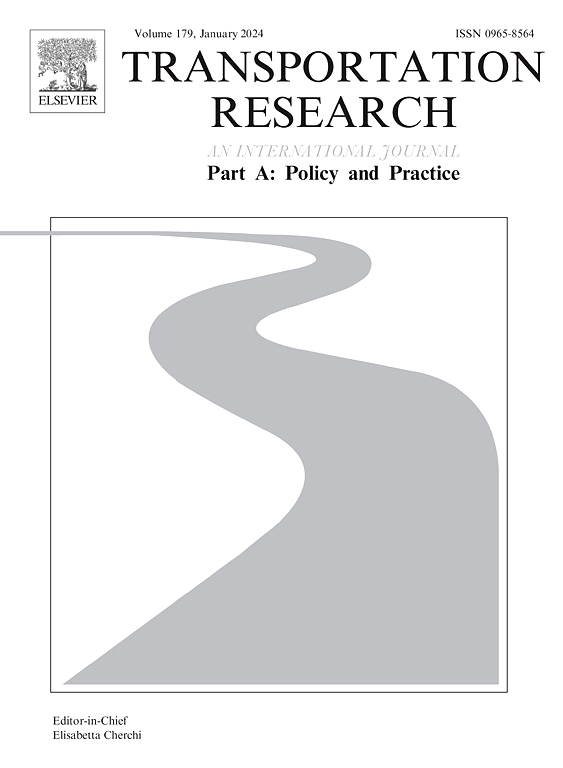How can smartphone apps increase electric vehicle user acceptance of supplier managed charging? An investigation of psychosocial constructs using Australian data
IF 6.8
1区 工程技术
Q1 ECONOMICS
Transportation Research Part A-Policy and Practice
Pub Date : 2025-09-13
DOI:10.1016/j.tra.2025.104662
引用次数: 0
Abstract
Electric vehicles are a promising technology to facilitate the decarbonisation of the transport sector. However, their environmental footprint depends on whether charging practices are aligned with renewable generation. Demand-side management strategies, such as supplier managed smart charging (SMSC), have emerged as a key approach to reduce the mismatch between energy generation and consumption patterns while optimising energy utilisation and enhancing grid stability. This paper examines factors influencing consumer intention to adopt SMSC. Additionally, it explores the role of smartphone apps in moderating the risk perception of users regarding supplier management. The study adopts a structural equation modelling framework and uses data from a sample of 994 drivers, including 97 EV owners, in the Australian context. Our findings reveal the interplay between several psychosocial factors, such as environmental responsibility, privacy concerns, and the desire for control, along with perceived relative advantages and risks associated with consumer-product interactions, in shaping consumer intentions toward SMSC adoption. We observe that the presence of an override app makes individuals less sensitive to the perceived risks as well as perceived advantages associated with supplier management. This suggests that the override ability can be a persuasion shortcut to get users onboard with supplier management. Additionally, our results indicate that strategies to tackle privacy concerns, such as transparent data practices, direct benefits for data sharing, and providing users with options to control their data, are essential to encourage SMSC adoption.
智能手机应用程序如何提高电动汽车用户对供应商管理充电的接受度?使用澳大利亚数据的社会心理结构调查
电动汽车是一项很有前途的技术,可以促进交通部门的脱碳。然而,它们的环境足迹取决于收费做法是否与可再生能源发电相一致。需求侧管理策略,如供应商管理的智能充电(SMSC),已经成为减少能源生产和消费模式之间不匹配,同时优化能源利用和增强电网稳定性的关键方法。本文探讨了影响消费者采用SMSC意愿的因素。此外,它还探讨了智能手机应用程序在调节用户对供应商管理的风险感知方面的作用。该研究采用了结构方程建模框架,并使用了澳大利亚994名司机的样本数据,其中包括97名电动汽车车主。我们的研究结果揭示了几个社会心理因素之间的相互作用,如环境责任、隐私问题、控制欲望,以及与消费者产品互动相关的感知相对优势和风险,在塑造消费者采用SMSC的意图中。我们观察到,覆盖应用程序的存在使个人对与供应商管理相关的感知风险以及感知优势不那么敏感。这表明,重写能力可以成为说服用户参与供应商管理的快捷方式。此外,我们的研究结果表明,解决隐私问题的策略,如透明的数据实践,数据共享的直接利益,以及为用户提供控制数据的选项,对于鼓励SMSC的采用至关重要。
本文章由计算机程序翻译,如有差异,请以英文原文为准。
求助全文
约1分钟内获得全文
求助全文
来源期刊
CiteScore
13.20
自引率
7.80%
发文量
257
审稿时长
9.8 months
期刊介绍:
Transportation Research: Part A contains papers of general interest in all passenger and freight transportation modes: policy analysis, formulation and evaluation; planning; interaction with the political, socioeconomic and physical environment; design, management and evaluation of transportation systems. Topics are approached from any discipline or perspective: economics, engineering, sociology, psychology, etc. Case studies, survey and expository papers are included, as are articles which contribute to unification of the field, or to an understanding of the comparative aspects of different systems. Papers which assess the scope for technological innovation within a social or political framework are also published. The journal is international, and places equal emphasis on the problems of industrialized and non-industrialized regions.
Part A''s aims and scope are complementary to Transportation Research Part B: Methodological, Part C: Emerging Technologies and Part D: Transport and Environment. Part E: Logistics and Transportation Review. Part F: Traffic Psychology and Behaviour. The complete set forms the most cohesive and comprehensive reference of current research in transportation science.

 求助内容:
求助内容: 应助结果提醒方式:
应助结果提醒方式:


